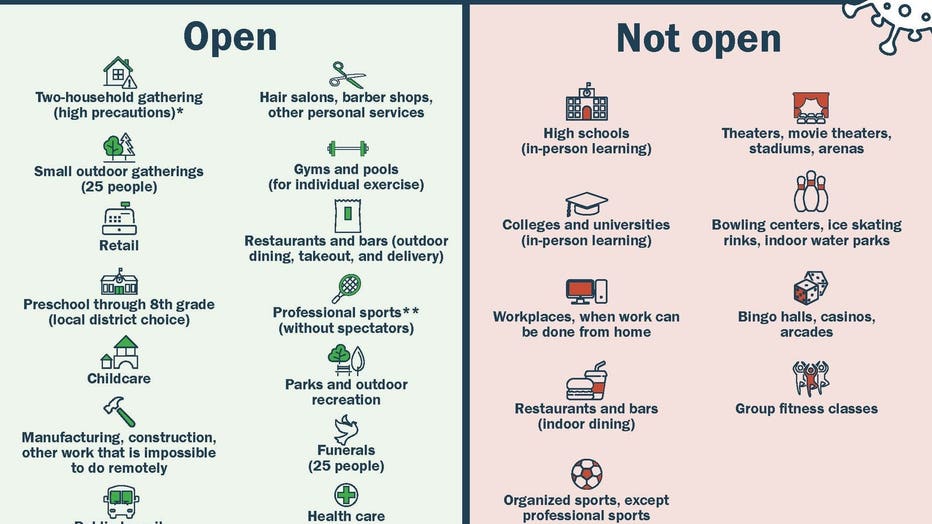Whitmer administration issues new restrictions to slow spread of COVID-19
Whitmer administration issues new restrictions to slow spread of COVID-19
Whitmer administration issues new restrictions to slow spread of COVID-19
SOUTHFIELD, Mich. (FOX 2) - Michigan Governor Gretchen Whitmer and her administration are announcing a "Three-Week Pause", creating new restrictions in an attempt to slow the spread of COVID-19 as the state has repeatedly broken its single-day case record over the past month.
Gov. Whitmer announced in a press conference Sunday evening after meeting with the Michigan Department of Health and Human Services that new restrictions are being put in place to try to slow COVID-19. This order is coming from the health department, which has issued all orders since the state Supreme Court ruled Whitmer did not have the authority to do so.
The order takes effect on Wednesday, Nov. 18 and is different from the blanket stay-home order issued in the spring.
The new restrictions will be in place for three weeks.
WHAT'S CLOSED
Under the "Three-Week Pause", workers in all fields must work from home if it can be done remotely.
Several businesses and services are closed:
- High Schools are closed to in-person learning
- Colleges and universities are closed to in-person learning
- All organized sports (except for professional)
- Theaters
- Movie theaters
- Stadiums
- Arenas
- Bowling Centers
- Ice skating rinks
- Indoor water parks
- Bingo Halls
- Casinos
- Arcades
- Group fitness classes
“Indoor gatherings are the greatest source of spread, and sharply limiting them is our focus,” said MDHHS Director Robert Gordon. “The order is targeted and temporary, but a terrible loss of life will be forever unless we act. By coming together today, we can save thousands of lives.”
WHAT'S OPEN
While the above businesses and services are forced to close, several others are still allowed to be open. The state is also allowing funerals up to 25 people to continue and gatherings of 10 people (two households with masks and precautions).
Additionally, the following businesses and services can remain open.:
- Hair salons, Barber Shops, other personal services
- Gyms
- Restaurants and bars (for outdoor dining, takeout, and delivery only)
- Preschool through 8th grade
- Retail businesses
- Childcare
- Manufacturing & construction
- Parks and outdoor recreation
- Professional sports (without spectators)
- Public transit
These orders are made possible through the agency's epidemic powers.
“The data we are seeing is alarming. COVID-19 is impacting every area of our state. Our healthcare systems are becoming overwhelmed, and our contact tracers cannot keep up,” said Dr. Joneigh Khaldun, chief medical executive and chief deputy for health at MDHHS. “If we do not act now, we risk thousands more deaths, and even more people having long-term health consequences. The actions we are taking today are the best opportunity we have to get this virus under control.”

HIGH SCHOOL SPORTS
Under the order, all high school sports are shut down for at least three weeks, including the high school football playoffs.
Whitmer, Khaldun, and Gordon said professional and college athletics have more testing and higher standards for risk mitigation.
The MHSAA suspended all fall tournaments for girls volleyball, girls swimming & diving and football, and all winter practices and competitions which were scheduled to start over the next three weeks.
“We understand the need for action, and we will explore all options to complete our Fall tournaments when restrictions are lifted. We will assess everything over the next three weeks relative to Fall and Winter sports and come up with a plan that keeps us connected to our goal, for months, of having three seasons that are played to their conclusions," said Executive Director Mark Uyl.
DAILY CASES SKYROCKET
Over the past six weeks, Michigan's daily cases have skyrocketed, setting new daily records nine times since Oct. 24. Last week, Dr. Kahldun said Michigan's daily case rate is 416 cases per million people.
The Upper Peninsula, Grand Rapids, Kalamazoo and Saginaw regions all have case rates between 497 - 653 cases per million people per day.
The Jackson, Detroit and Lansing regions are seeing case rates in the 300s cases per million people per day.
The Traverse City region has the lowest case rate - 278 cases per million people per day.

